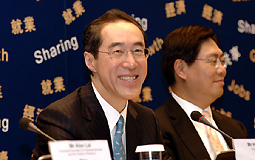 |
| Taxing time: A nine-month consultation, to begin in the middle of this year, will allow the public adequate time and ample opportunity to raise their concerns about a proposed Goods & Services Tax and voice their ideas, Financial Secretary Henry Tang says. |



|
Financial Secretary Henry Tang says he was not looking for short-lived applause but considering Hong Kong's long-term interest when he prepared the Budget he delivered today.
At a press briefing this afternoon, he told reporters he had done his best to share the wealth with the public after Hong Kong registered its first surplus since the handover. But he stressed there would be an operating account surplus of only $625 million in 2006-07, leaving little room for further tax concessions.
This year's Budget offers light tax relief to more than 1 million taxpayers, costing the Government $1.2 billion in revenue. "If we go further, the operating account would record a deficit," Mr Tang said.
"As the Financial Secretary, I must fulfill my duties under the Basic Law, to ensure we have a balanced budget and be prudent in financial management."
He stressed he was trying his best to keep Hong Kong living "within its means", while its financial position is still vulnerable.
"I was constantly mindful that while this recovery is a hard-earned recovery, it's due to the Government controlling our expenditure, and the support of the civil service, and the support of the community," he said.
He noted Hong Kong is in better fiscal shape than it has been since 1997, and thanked the public for its support of the Government's work.
Government revenue equals roughly 18% of GDP, while Government spending is slighly below 18% of GDP. If we spend more or collect less, Hong Kong will not be able to live within its means, he said.
To broaden the tax base, the Government will launch a public consultation on what Mr Tang describes as a "controversial" goods and services tax, or GST.
Consultation exercise to discuss controversial GST
"In the two years or so since I took up post, people told me I would have a short-lived career if I even mentioned GST," he said. But, he added, Hong Kong lacks flexibility in terms of raising revenues. In future, demands for public expenditure will only go up, he says, as more people hit the age of 65 and up, stop working, and have a greater impact on health and welfare costs.
"A GST is a reliable source of revenue, and when we have a turnaround in the economy as we do now, it is time for us to calm down and have a rational discussion," he added.
If a GST is implemented in future, everyone will pay it, so its impact will be widespread. A nine-month consultation, to begin in the middle of this year, will allow public adequate time and ample opportunity to raise their concerns and voice their ideas, he said.
The consultation paper will not introduce a timetable, he stressed. As people will not welcome any new tax, it must be presented with a series of specific recommendations or choices for people to make.
"We will lay them out carefully in the whole document, so they can make an informed and rational discussion on the subject.
"I think the community is mature enough and ready to discuss this."
Similarly, there would soon be a consultation regarding healthcare-finance reforms. The Government is picking up 95% of the tab for healthcare in Hong Kong, and demands for healthcare services were growing, especially as the population aged and technology advances made new treatments and services available.
First principle: 'Big market, small government'
The Government's first principle remains unchanged: "big market, small government". The Administration will review what Government assets could be sold or securitised to be run by the commercial sector. Deciding what assets to sell when depends on market conditions.
"We don't want to dispose of them at the wrong time," he said. "There is less urgency now than there was a few years ago, giving us more room to wait for the right time."
On a positive note, the Financial Secretary said the Government would continue talks with the Mainland on introducing new renminbi services in Hong Kong, giving us first-mover advantage while opening the door to overseas countries to do more business across the boundary.
He also said a renewed focus on tourism would help create jobs, especially for those with few skills who had been left behind in the earlier economic restructuring.
This year's Budget aimed to protect Hong Kong from any external shocks such as a bird-flu pandemic or sudden correction in US asset prices. So while he was being cautious, he admitted there could be some room for concessions next year if the situation continued to improve.
Go To Top
|



